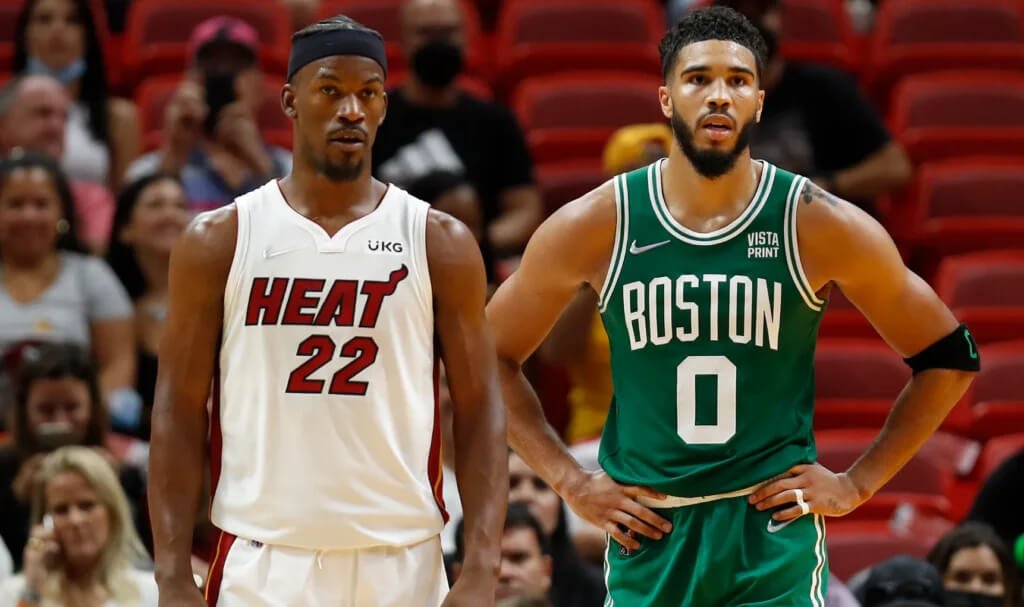Miami Heat Vs Boston Celtics Match Player Stats: The Miami Heat vs. Boston Celtics rivalry is one of the most exciting matchups in the NBA. Both teams have storied histories and have consistently been at the forefront of the Eastern Conference, often clashing in high-stakes games. This article delves into the player stats from a recent matchup between the Miami Heat and the Boston Celtics, analyzing performances, key metrics, and the impact of individual players on the game’s outcome.
Introduction to the Rivalry
The Miami Heat and the Boston Celtics have faced off numerous times in the regular season and playoffs. The rivalry intensified during the LeBron James era when the Heat’s “Big Three” frequently battled the Celtics’ seasoned roster. Over the years, both teams have undergone significant changes, but the intensity of their matchups remains the same.
Historical Context
Historically, the Boston Celtics have been one of the most successful franchises in the NBA, boasting 17 championships. On the other hand, the Miami Heat, despite being a relatively younger franchise, have established themselves as a powerhouse in the NBA, winning three championships. The contrast between the Celtics’ storied past and the Heat’s modern-day dominance adds an extra layer of excitement to their matchups.
Breakdown of Recent Matchup: Key Player Performances
In a recent game between the Miami Heat and the Boston Celtics, the performance of individual players played a crucial role in determining the outcome. Below is a detailed analysis of the key players from both teams, highlighting their stats, contributions, and impact on the game.
Miami Heat Key Players
Jimmy Butler
Points: 28
Rebounds: 8
Assists: 5
Steals: 2
Field Goal Percentage: 45%
Jimmy Butler has been the cornerstone of the Miami Heat since his arrival. In this matchup, Butler showcased his all-around abilities, leading the team in scoring while also contributing significantly on the defensive end. His ability to penetrate the Celtics’ defense and create scoring opportunities for himself and his teammates was a key factor in the Heat’s offensive strategy.
Bam Adebayo
Points: 15
Rebounds: 12
Assists: 6
Blocks: 3
Field Goal Percentage: 52%
Bam Adebayo continues to be a dominant force in the paint for the Miami Heat. His double-double performance in this game was critical, as he not only contributed offensively but also provided a strong defensive presence. Adebayo’s ability to guard multiple positions and protect the rim made it difficult for the Celtics to score inside.
Tyler Herro
Points: 20
Rebounds: 4
Assists: 3
Three-Point Percentage: 38%
Tyler Herro’s scoring off the bench was vital for the Miami Heat. His ability to knock down shots from beyond the arc and his confidence in taking big shots helped the Heat maintain their lead during crucial moments of the game. Herro’s development into a reliable scorer has been one of the highlights of the Heat’s season.
Boston Celtics Key Players
Jayson Tatum
Points: 32
Rebounds: 10
Assists: 4
Steals: 1
Field Goal Percentage: 47%
Jayson Tatum was the standout performer for the Boston Celtics in this matchup. His scoring ability was on full display as he led the team in points, while also contributing significantly on the boards. Tatum’s versatility as a scorer, whether driving to the basket or shooting from long range, kept the Celtics in the game until the final moments.
Jaylen Brown
Points: 24
Rebounds: 6
Assists: 2
Field Goal Percentage: 44%
Jaylen Brown provided excellent support to Tatum, scoring efficiently and playing solid defense. Brown’s athleticism and ability to score in transition were crucial for the Celtics, especially when they needed to close the gap during the Heat’s scoring runs. His all-around performance highlighted his importance to the team’s success.
Marcus Smart
Points: 12
Rebounds: 5
Assists: 7
Steals: 3
Field Goal Percentage: 39%
Marcus Smart’s impact on the game went beyond the stat sheet. Known for his tenacity and defensive prowess, Smart played a key role in trying to contain the Heat’s offensive threats. Although his shooting numbers were not spectacular, his ability to disrupt the opposing team’s rhythm and create turnovers was invaluable for the Celtics.
Team Performance Analysis
Beyond individual performances, the overall team dynamics, shooting percentages, defensive efforts, and bench contributions significantly influenced the game’s outcome. Let’s break down these aspects for both teams.
Miami Heat Team Performance
| Statistic | Value |
|---|---|
| Total Points | 108 |
| Field Goal Percentage | 48% |
| Three-Point Percentage | 36% |
| Free Throw Percentage | 82% |
| Total Rebounds | 45 |
| Offensive Rebounds | 10 |
| Assists | 25 |
| Turnovers | 12 |
| Steals | 8 |
| Blocks | 6 |
The Miami Heat’s overall performance was characterized by efficient shooting, particularly from the free-throw line, where they capitalized on nearly every opportunity. Their ability to move the ball and find the open man was evident in their assist numbers, reflecting a cohesive team effort. Defensively, the Heat were active, generating steals and blocking shots to stifle the Celtics’ offense.
Boston Celtics Team Performance
| Statistic | Value |
|---|---|
| Total Points | 105 |
| Field Goal Percentage | 45% |
| Three-Point Percentage | 33% |
| Free Throw Percentage | 78% |
| Total Rebounds | 42 |
| Offensive Rebounds | 8 |
| Assists | 22 |
| Turnovers | 14 |
| Steals | 7 |
| Blocks | 4 |
The Boston Celtics were competitive throughout the game, but their slightly lower shooting percentages and higher turnover rate ultimately hurt their chances. While they matched the Heat in several areas, the Celtics’ inability to consistently score from beyond the arc and their struggles at the free-throw line were critical factors in their narrow loss.
Key Matchup: Jimmy Butler vs. Jayson Tatum
One of the most intriguing aspects of this game was the head-to-head battle between Jimmy Butler and Jayson Tatum. Both players are the undisputed leaders of their respective teams, and their performances were pivotal to the game’s outcome.
Scoring and Efficiency
| Player | Points | Field Goals Made | Field Goals Attempted | Field Goal Percentage |
|---|---|---|---|---|
| Jimmy Butler | 28 | 9 | 20 | 45% |
| Jayson Tatum | 32 | 12 | 25 | 47% |
Both players had impressive scoring nights, with Tatum slightly outscoring Butler. However, Butler’s ability to draw fouls and get to the free-throw line gave him an edge in terms of efficiency, as he was able to score crucial points when the Heat needed them the most.
Defensive Impact
| Player | Steals | Blocks | Defensive Rebounds | Total Rebounds |
|---|---|---|---|---|
| Jimmy Butler | 2 | 0 | 7 | 8 |
| Jayson Tatum | 1 | 0 | 8 | 10 |
Defensively, both players were active, with Tatum slightly edging out Butler in total rebounds. However, Butler’s two steals contributed to the Heat’s defensive efforts, helping to create fast-break opportunities that swung the momentum in their favor.
Playmaking and Leadership
| Player | Assists | Turnovers |
|---|---|---|
| Jimmy Butler | 5 | 3 |
| Jayson Tatum | 4 | 2 |
In terms of playmaking, Butler had the edge with more assists, showcasing his ability to facilitate the offense and involve his teammates. Tatum, while also contributing as a playmaker, focused more on scoring in this matchup.
Bench Contributions: Miami Heat vs. Boston Celtics
The contributions from the bench can often be the difference between winning and losing in tightly contested games. Let’s examine how the bench players performed in this matchup.
Miami Heat Bench
| Player | Points | Rebounds | Assists | Field Goal Percentage |
|---|---|---|---|---|
| Tyler Herro | 20 | 4 | 3 | 38% |
| Duncan Robinson | 8 | 2 | 1 | 40% |
| Dewayne Dedmon | 5 | 6 | 1 | 50% |
Tyler Herro was the standout performer off the bench for the Miami Heat, providing much-needed scoring and energy. Duncan Robinson also chipped in with timely three-pointers, while Dewayne Dedmon contributed on the boards and added some interior defense.
Boston Celtics Bench
| Player | Points | Rebounds | Assists | Field Goal Percentage |
|---|---|---|---|---|
| Derrick White | 10 | 3 | 2 | 42% |
| Grant Williams | 6 | 4 | 1 | 36% |
| Payton Pritchard | 7 | 2 | 1 | 38% |
For the Celtics, Derrick White led the bench in scoring, while Grant Williams provided his usual grit and defense. Payton Pritchard added some shooting and hustle, but overall, the Celtics’ bench was outperformed by the Heat’s reserves.
Statistical Comparisons and Game Flow
Analyzing the flow of the game through statistical comparisons provides insights into how each team managed the various phases of the matchup. This section breaks down the critical stats that influenced the outcome.
Shooting Efficiency
| Team | Field Goal Percentage | Three-Point Percentage | Free Throw Percentage |
|---|---|---|---|
| Miami Heat | 48% | 36% | 82% |
| Boston Celtics | 45% | 33% | 78% |
The Miami Heat’s superior shooting efficiency, particularly from the free-throw line, gave them an edge in this matchup. Their ability to convert at a higher rate across all shooting categories was a significant factor in their victory.
Rebounding Battle
| Team | Offensive Rebounds | Defensive Rebounds | Total Rebounds |
|---|---|---|---|
| Miami Heat | 10 | 35 | 45 |
| Boston Celtics | 8 | 34 | 42 |
The rebounding battle was closely contested, but the Miami Heat edged out the Celtics with a slight advantage. This allowed the Heat to secure extra possessions, which they capitalized on during critical moments.
Turnover Comparison
| Team | Turnovers |
|---|---|
| Miami Heat | 12 |
| Boston Celtics | 14 |
Turnovers played a crucial role in the game’s outcome. The Celtics’ higher turnover count led to more fast-break opportunities for the Heat, which they converted into points. In a game as tightly contested as this one, each turnover had a significant impact on the final score.
Strategic Adjustments and Coaching Impact
The strategic decisions made by the coaches also played a pivotal role in how the game unfolded. Let’s explore the adjustments made by both teams and how they impacted the flow of the game.
Miami Heat: Erik Spoelstra’s Adjustments
Erik Spoelstra, known for his tactical acumen, made several key adjustments throughout the game. Recognizing the Celtics’ strength in transition, Spoelstra emphasized slowing down the pace and setting up in half-court sets to exploit mismatches. He also made timely substitutions to keep his players fresh, particularly in the fourth quarter, where the Heat needed to hold off the Celtics’ late surge.
Boston Celtics: Joe Mazzulla’s Tactics
Joe Mazzulla, the Celtics’ head coach, focused on exploiting the Heat’s defense by pushing the pace and looking for early scoring opportunities. However, as the game progressed, Mazzulla had to adjust his strategy, especially when the Heat’s defense tightened. His decision to go with a smaller lineup to increase spacing had mixed results, as it opened up driving lanes for the Heat but also gave the Celtics more perimeter shooting opportunities.
Conclusion
The Miami Heat vs. Boston Celtics matchup was a thrilling contest that showcased the talents of some of the NBA’s brightest stars. The game was a back-and-forth battle, with both teams displaying their strengths and weaknesses. Ultimately, the Miami Heat’s superior shooting efficiency, defensive tenacity, and key contributions from their bench were the deciding factors in their victory.
As both teams continue their journeys through the season, this game serves as a reminder of the intensity and excitement that the Miami Heat vs. Boston Celtics rivalry brings to the NBA. Fans can expect more epic battles between these two teams as they vie for supremacy in the Eastern Conference.
You may also read: The Pizza Edition




